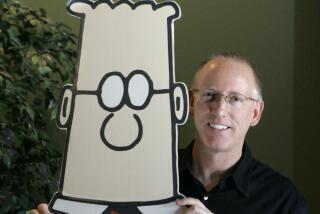ADAMS’ UNIVERSE STILL EXPANDING
- Share via
Wasn’t it enough that Arthur Dent had to have his house demolished and his planet (Earth) destroyed? Or that he then had to put fish in his ear, listen to Vogon poetry (the third worst in the universe), suffer the complaints of a depressed robot and be fired at by missiles from the planet Magrathea?
Oh, no. Dent’s creator, British author Douglas Adams, put his most famous character through the cycle of misadventures again and again in various forms of “The Hitchhiker’s Guide to the Galaxy.” It has been a BBC radio series (currently being re-broadcast over KCRW-FM (89.9) Tuesday nights at 7), a BBC television series (shown every once in a while on PBS stations), two records, four books, a stage play and an interactive computer game.
Adams also planned to send Dent and company through yet another medium: A movie version of “Hitchhiker’s Guide” was planned but never made.
The film script, Adams said in a recent visit to Los Angeles, has been “Hollywooded” by delays and other frustrations. Typical, in Adams’ view of mankind.
Frustrating circumstances are his pet peeve. They’re also grist for his creative mill. Bureaucratic foul-ups, stupid people and other daily trials are the hinges upon which his plots wickedly swing.
In fact, Adams was in town to promote a new computer game called “Bureaucracy,” where his admitted obsession with life’s boundless obstacles reaches its exasperated apex.
Fans of “Hitchhiker’s Guide,” particularly those who have played the computer version, will find much that’s familiar in this new game, created by Adams and others at the innovative Massachusetts-based Infocom.
Just as Arthur Dent found bureaucratic bungling throughout the civilizations of the galaxy, the unsuspecting person sitting down to “Bureaucracy” will find that everyone he encounters--from bank tellers to waitresses--reacts with a mixture of ineptness, rudeness and illogic. The people-made machines are even worse.
Just as in real life.
You lose the game, in fact, when the computer’s constant estimate of your blood pressure brings about the following result:
Your blood pressure soars to 238/139, causing a small vessel in your brain to rupture. You sink into coma and die without pain. You are dead.
Your blood pressure now is 0/0 in 137 moves. Your status is Defunct. Your score is 0 out of 21, making you a Victim.
This being a computer game and not real life, you can always restart.
But do you really want to with “Bureaucracy”? While sprinkled with Adams’ wit, it’s a game that takes a particular frame of mind to enjoy. Like maybe masochistic?
“Well,” Adams said with a laugh, “not quite.” He paused and considered the thought. “By re-creating the situation (of dealing with bureaucracy), we’ve said we know what this is like, we know what you’re going through. We can all face this together. It’s as much to elicit a sense of ‘Yeah, I’ve gone through that’ as anything else.”
Isn’t this sense central to “Hitchhiker” as well?
“Yes,” Adams said. “I don’t know if these annoying things happen to me more, or it’s just something that infuriates me more than it does other people. In any case, I certainly have sympathy with people who don’t handle those situations well. Because I’m one of them.”
Instead of tearing out his hair when confronted by trivial frustrations, Adams vents his trampled feelings in crisp prose with a dark bend of humor that he admits is influenced by P. G. Wodehouse, Evelyn Waugh and Monty Python.
Born in Cambridge, England, in 1952, Adams naturally wound up attending the university there, adding his name to the list of illustrious future comedians who took part in the school’s Footlight Club and its famous satirical revues. Among them: Peter Cook, Dudley Moore and Python’s John Cleese and Graham Chapman. After leaving Cambridge, Adams briefly collaborated with Chapman, and penned several episodes for the cult favorite “Dr. Who,” a humor-tinged science-fiction TV series.
Alas, he couldn’t entrench himself at the BBC and he became broke enough to accept a position as a bodyguard for a sheik. Being a husky lad well over 6 feet, Adams looks as if he could have handled trouble, but he insists that his job merely called for him “to stand outside the door, bow occasionally and run if anyone showed up with a hand grenade.”
During his off hours, he began to flesh out an idea that came to him when he was on holiday in Innsbruck. Lying slightly drunk outside his inn and staring at the stars, “The Hitchhiker’s Guide to Europe” in his pocket, he suddenly thought that a “Hitchhiker’s Guide to the Galaxy” would be even handier.
He sold the idea to the BBC for a radio series, and Arthur Dent and Douglas Adams were on their way for the big ride.
Adams has probably enjoyed the ride more than Dent: The books have sold more than 10 million copies, and the Simon & Schuster contract for his next two books awards him $3.5 million. The first book, just published, is a “ghost-horror-detective-who-dunit-time-travel-romantic-comedy-epic” called “Dirk Gently’s Holistic Detective Agency,” which, says its author, is unrelated to “Hitchhiker’s Guide.”
Until about four years ago, Adams regarded the computer, when he regarded it at all, as merely another annoyance to mock.
“I was very skeptical about computers up until 1983,” he confessed. “A friend persuaded me to try a computer simply as a word processor, and even after I did, that’s the only way I thought I would use one.”
The same friend later showed Adams one of Infocom’s story-oriented games. “It was different from anything I’d expected--literate and witty stuff that relied on your imagination to make it work. I felt here was a kindred spirit.”
Adams agreed to write a computer version of “Hitchhiker’s Guide,” and he now owns several computers. He no longer just makes fun of a fictional future but does a lot of thinking about the real one.
For example, he anticipates the day--within five years, he believes--when many of us will be able to buy a computer for $2,000 or $3,000 that “will be more powerful than the most powerful computer anywhere today. Ninety-five percent of that power will be used to work out what you want to do. It won’t matter whether people are computer literate.
“If you’re not interested in computers now, just wait a while.”
Tomorrow’s most popular computer, as envisioned by Adams, may be about the size of a book and just as easy to use and carry about. Voice-activated, powered by batteries or solar energy, employing interactive compact discs providing TV images and stereo sound, this future computer will make current ones seem as outmoded as the typewriter.
But does that mean that the book will become basically obsolete?
“Not at all. Books will remain a central form of expression. Even though I’m now a computer junkie, and even though we’ll have book-size computers, nothing is likely to replace these wonderful things that you can sit down and flip open on a plane or wherever. It’s a perfectly evolved medium.”
When Adams isn’t writing or computing or composing music, he’s off to some technology-forsaken place to observe wildlife. Deeply committed to preserving endangered species, he went to Madagascar last year “to observe the aye-aye, the rarest of the lemurs. It was the most stimulating thing I’d ever done.” Next year, he plans further excursions and a book on wildlife preservation.
Does all this possibly mean he prefers other animals to that species so adept at being ineptly bureaucratic?
“Well,” said Adams, grinning at the thought, “who was it that said, ‘The more I see of the human race, the more I love my dog’? A man named Johnson, I think.
“I know what he meant.”
More to Read
The biggest entertainment stories
Get our big stories about Hollywood, film, television, music, arts, culture and more right in your inbox as soon as they publish.
You may occasionally receive promotional content from the Los Angeles Times.










